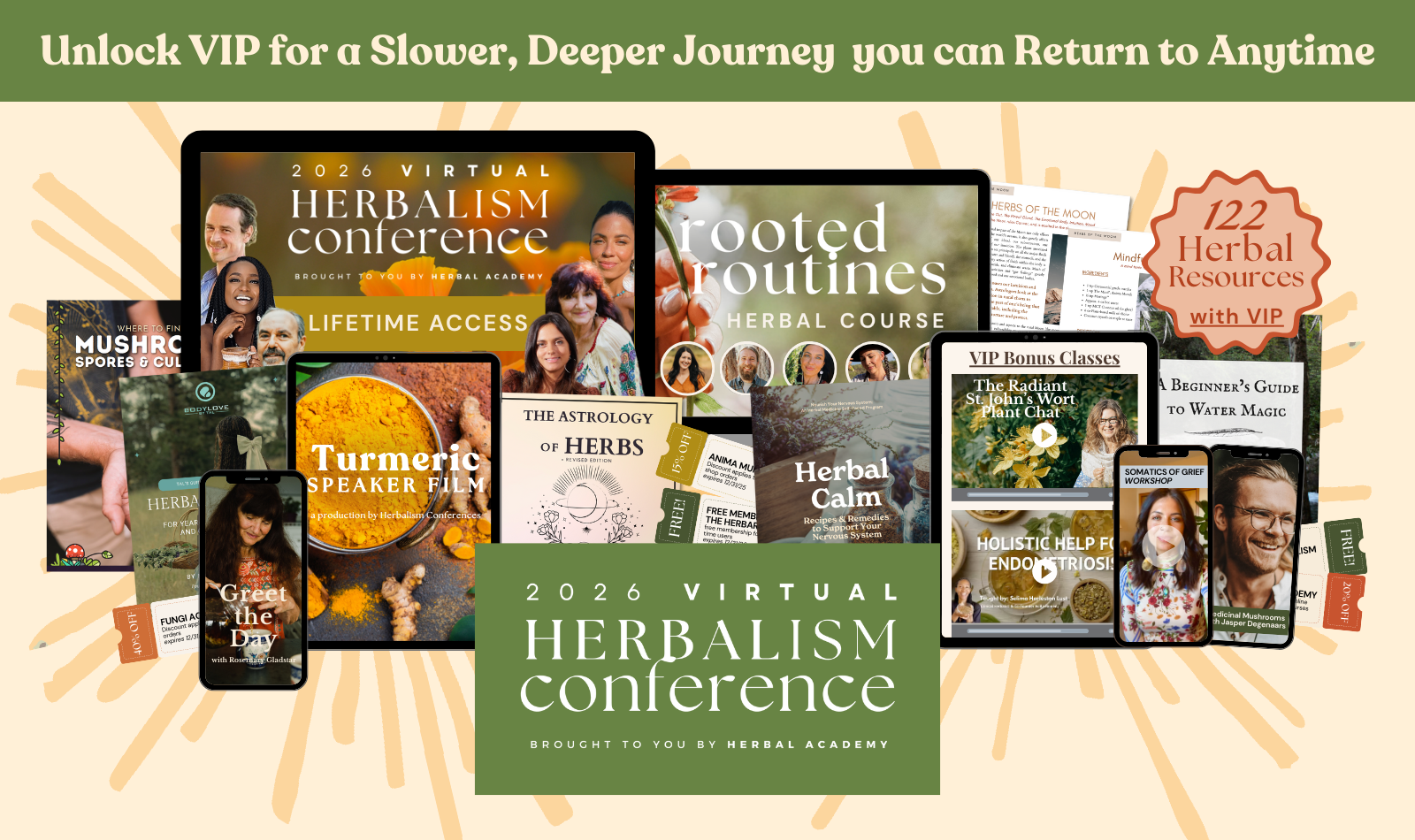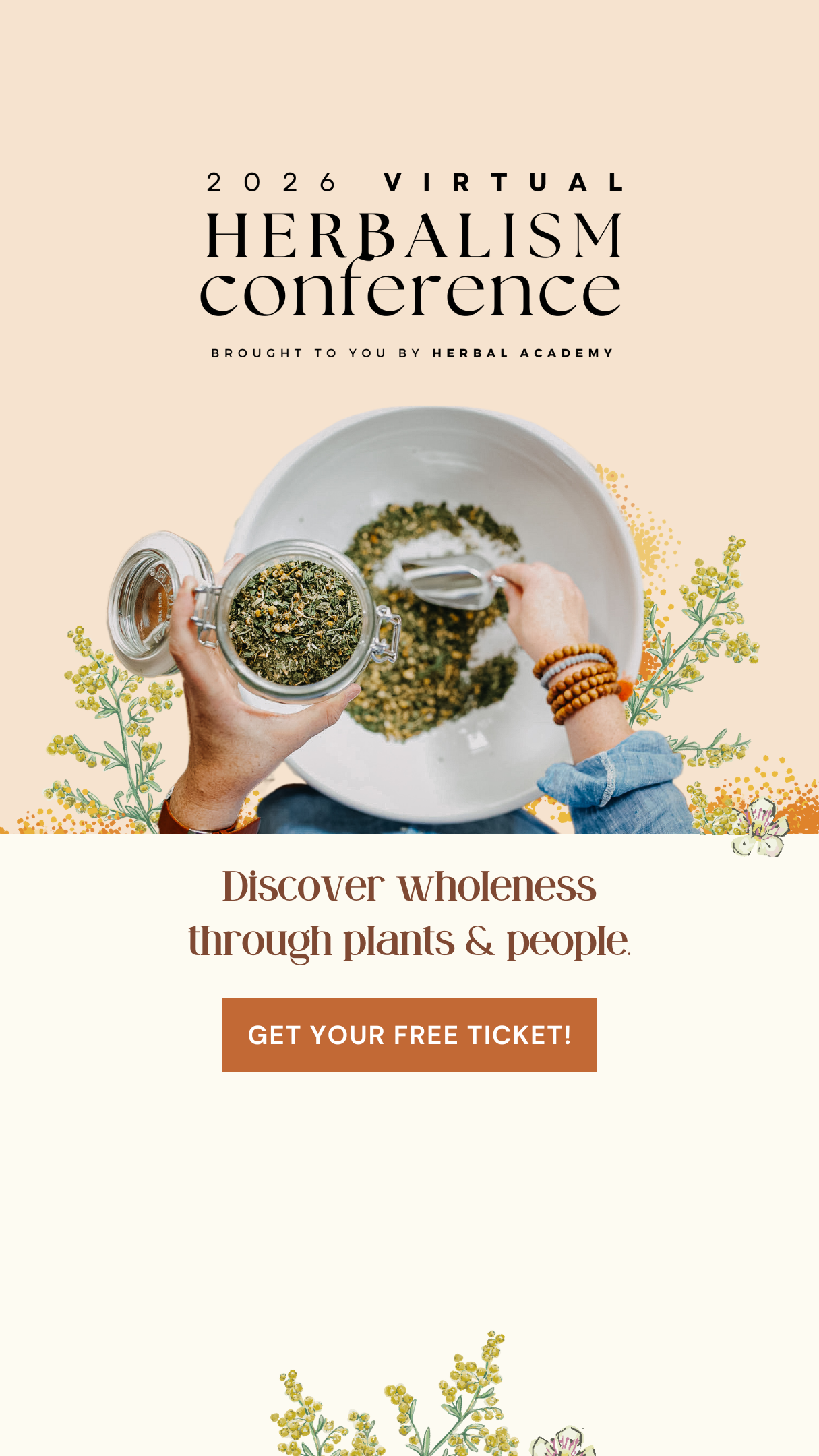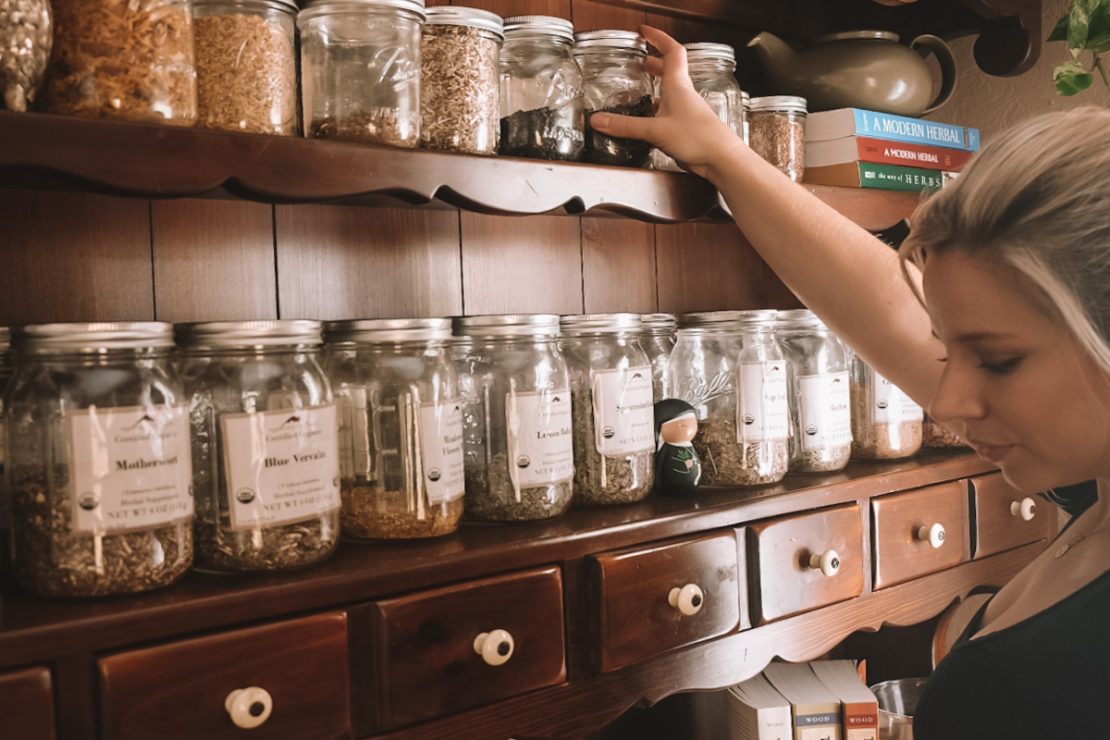
Student Feature Series: Caitlin Frazier @TheLocustsandHoney
For the ninth installment of our Student Feature Series, we spoke with herbalist Caitlin Frazier (@TheLocustsandHoney). She completed the Herbal Academy’s Clinical Herbalist Path, as well as the Materia Medica, and Botany & Wildcrafting courses. You can find her at Locusts & Honey where she blogs on topics from herbalism to travel as well as offering an herbal consulting business.
HA: Please tell us a little bit about yourself and how you started your path into herbalism.
Caitlin Frazier: In 2014, when I was 26, I was having the full experience of a quarter-life crisis…I had sold just about everything, moved back in with my parents, and decided to hike El Camino De Santiago in Spain for a little soul searching (a 500 mile, 36-day soul search to be exact). Along the way, I met a young German man who would forage plants along the path and make teas every night. I was totally intrigued! I had grown up around a lot of natural health advocates and wasn’t a stranger to herbs, but I had never experienced herbalism quite like that. After completing my hike, I knew I wanted to pursue this plant path, this was the missing piece of meaning I was looking for. But being an EXTREMELY Type A, overachieving kind of person, I knew the only way I wanted to do it was to go all in. So I spent a year researching schools and programs until I finally landed on the Herbal Academy’s Clinical Herbalism program.
HA: Why did you choose to pursue your herbal education with the Herbal Academy?
Caitlin Frazier: To be honest, what sold me first was the aesthetic! As I mentioned before, I’m really Type A. I like clean lines and am a sucker for a beautiful website. That was definitely the first win for HA. But what I found most enticing was the very professional, scholarly nature of each of the courses. I like science, facts, and an academic presentation. Much of herbalism comes off very bohemian and right-brained, and I knew I couldn’t learn that way. I needed structure, and the Herbal Academy offered that. It was the perfect way for me to dive into herbalism.
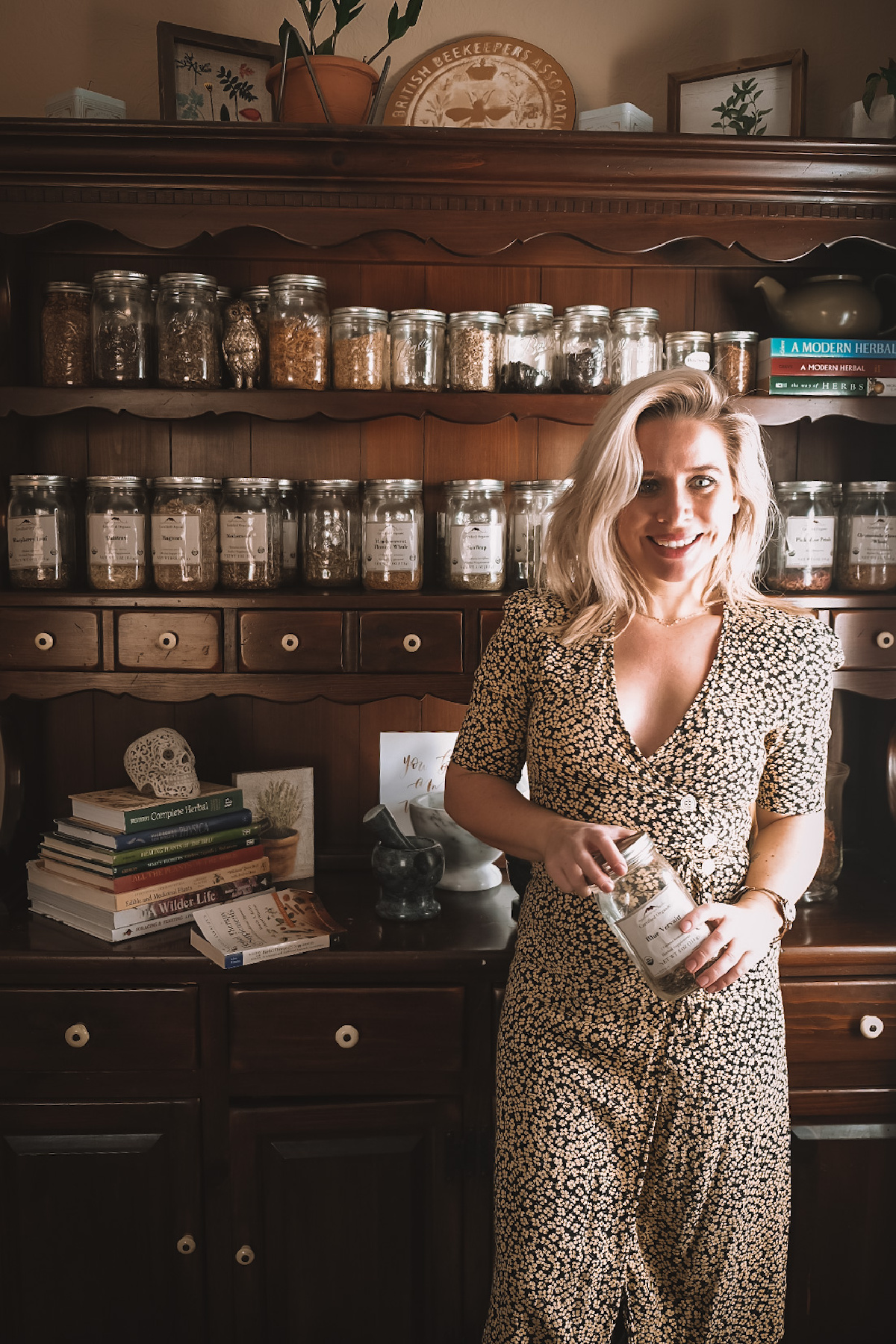
HA: Do you own an herbal business or brand?
Caitlin Frazier: YES! Locusts & Honey is a well-living brand that consists of a blog that covers topics from herbalism to travel, as well as an herbal consulting business. I seek to create a space for herbalism that is clear and straightforward for those who wish to incorporate better health practices into their daily lives.
HA: How did your Herbal Academy courses help shape or improve your business?
Caitlin Frazier: The Herbal Academy taught me to DO MY RESEARCH. Therefore every blog post that delves into any herbal or health-related topic is researched for weeks before being published. The courses introduced me to some of the best herbalists and teachers in the world; I know I can reference them often and will have solid information. It’s very hard to find good, true, thorough health information in the age of the internet. Herbal Academy gave me the confidence to write and know where I could get true and valid information, whether through the Academy itself, or through the teachers and writers that the Herbal Academy introduced me to.
HA: Did your Herbal Academy courses help you avoid any potential mistakes while launching your business?
Caitlin Frazier: Absolutely. Again, I was able to avoid spreading false information or reductionistic herbalism through the education I received at the Herbal Academy. It helped me to refrain from using “this for that” terminology and to approach my writing with constitutions and energetics in mind.
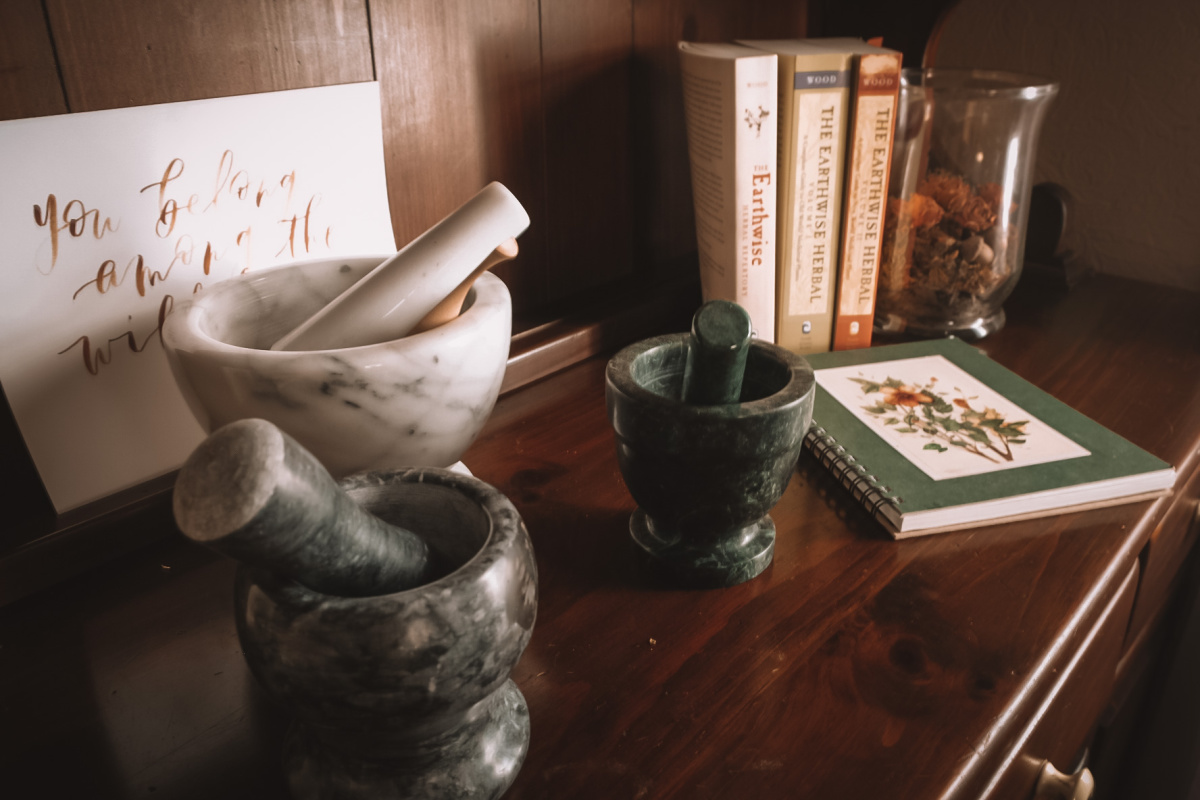
HA: Tell us, what’s next for you in your herbal journey?
Caitlin Frazier: Well, the timing of this question is interesting. I finished my advanced courses in February 2018, and then furthered my education for all of 2019 and much of 2020, finally finishing at the end of August 2020. In November of 2020 I announced that I was going to shut down the whole thing. 2020 and COVID-19 left me feeling a bit hopeless and like my words no longer held any weight. It’s odd to write or consult about health in the middle of the greatest health crisis in several generations. However, fate had other ideas, and Locusts & Honey saved itself in the end. So now I’m open to whatever comes next, but I’m not completely sure what that may be. I’ll still be writing, but I have a feeling it will look a little different than it did before. I’ve also really gotten into cooking recently. Something I thought I was terrible at…but it turns out I’m not so bad as long as I also include herbs into my recipes. Perhaps something more will come out of that! I’m a much better chef if I look at it from a medicinal point of view!
HA: What were you looking for when you enrolled in your Herbal Academy course that you were not able to find elsewhere?
Caitlin Frazier: Herbal Academy provides incredible academic structure! I needed quizzes, deadlines, and challenges to keep me on track and focused on the goal. I felt like I was truly achieving something after every unit. It was important for my growth as an herbalist to hit those milestones.
HA: What did you like most about your Herbal Academy course?
Caitlin Frazier: I loved the sheer volume of information and how it encompassed so many different paths. I never wanted to make my own products, but if I did, I have all the right information at my fingertips through Herbal Academy. I love that so much. Herbal Academy provided all the information needed to take on any path I chose—and to walk that path with confidence!
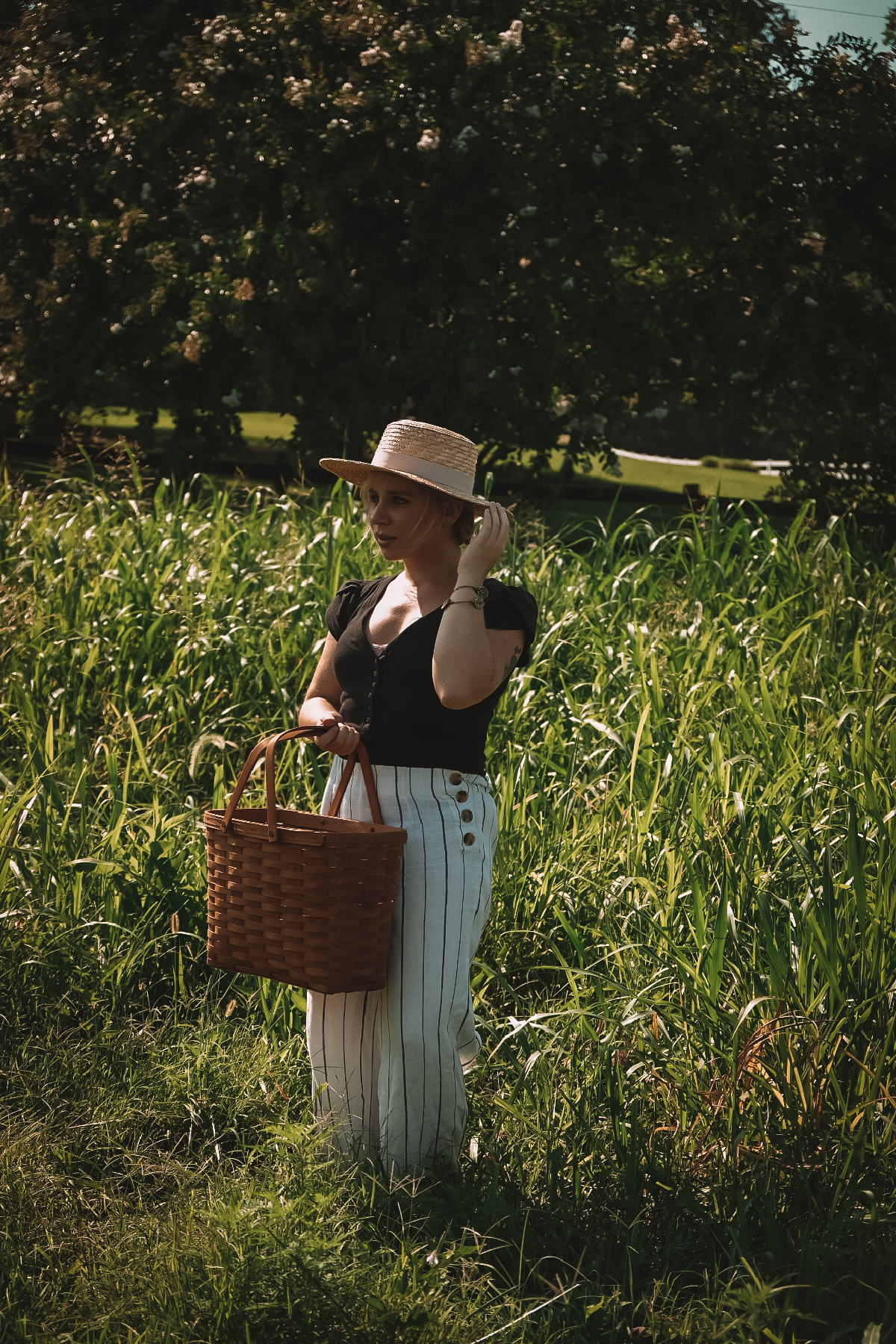
HA: How has your herbal education deepened your connection with nature and the seasons?
Caitlin Frazier: You become very in sync with the seasons once you really get into herbalism. For every season, there is an herb, and sometimes the herbs come just before you need them. Elderberry has this beautiful way of making itself known JUST before everyone goes back to school and you’ll need lots of elderberry syrup on hand.
You learn to love tree medicine in the winter and take great joy in that first dandelion and violet in the early spring, perfect for clearing out the winter’s toll.
I go to bed much earlier in the winter, and eat more fresh herbs in the spring and summer, and dig for those roots in the fall. Once you learn the rhythm of the herbs, that rhythm becomes your own. It makes the year more exciting, and makes every season more mindful and intentional.
HA: How has your herbal education deepened your connection with your personal health and wellbeing?
Caitlin Frazier: It has created what I like to call “body literacy.” I’m a huge proponent of this now. It’s amazing how much our bodies tell us on a daily basis, and if we’d only slow down to listen, we could learn so much!
I think there’s a misconception that herbalism will make you illness-free…that’s not true, though we’re definitely healthier. What is true, is that through herbalism you learn the cues from your body and how to approach it. I know the difference between sinus headaches and my migraines…and which herbs to use. I can tell from the lines and blemishes on my face which organ may need extra attention. I know when a cold is coming and how to avoid it, what herbs to use the week before a period to avoid endometriosis pain, and which nervines are best for me…and which will leave me asleep at work. It’s astounding. And it becomes such a part of your life you don’t even realize that you’re having a constant conversation with your body and the herbs anymore.
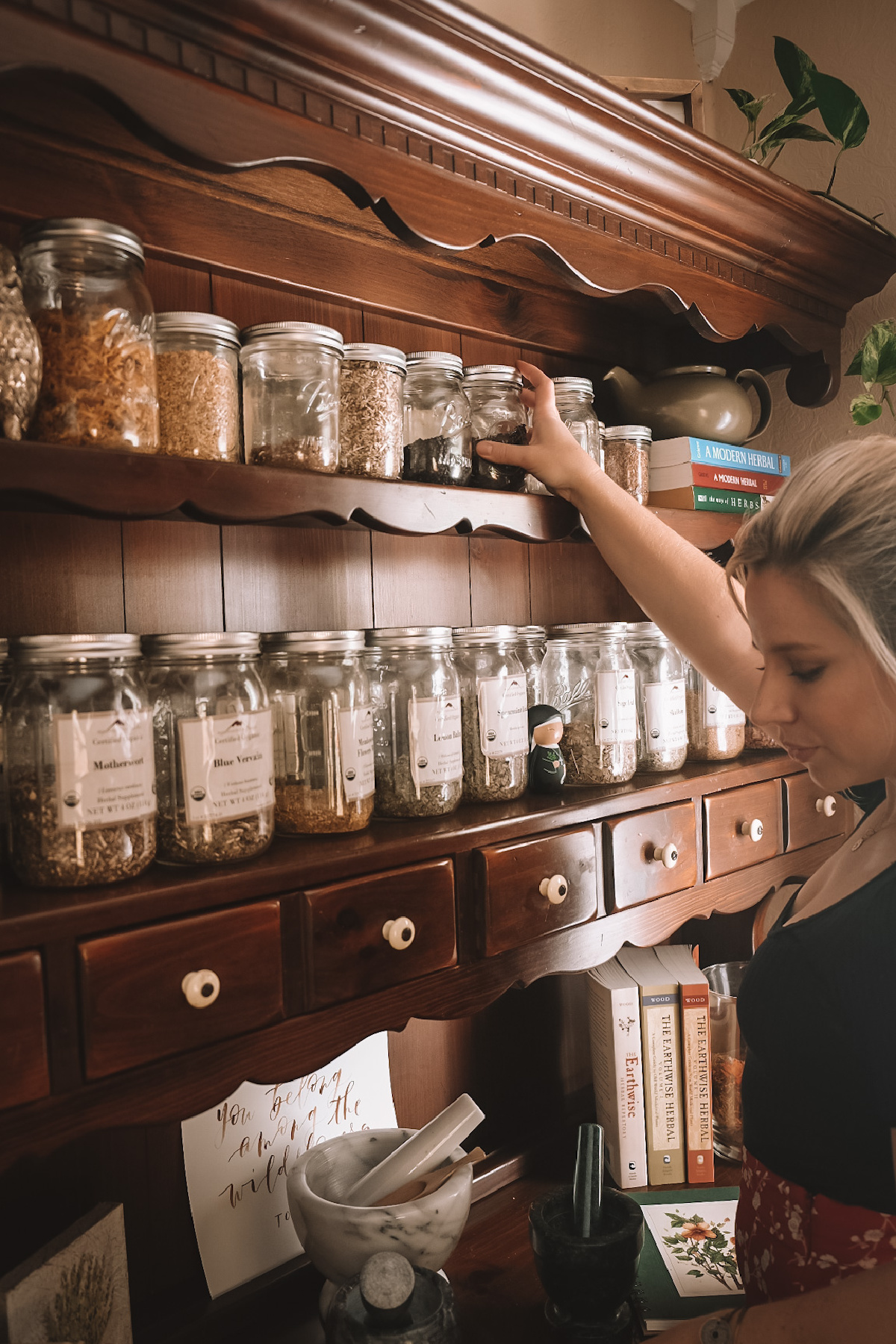
HA: Do you feel empowered by your herbal practice?
Caitlin Frazier: Absolutely. I love that for everything from a papercut to high blood pressure, “there’s an herb for that.” It’s incredibly empowering to listen to people discuss their health woes (and I’ve learned that people LOVE to discuss their health) and to start formulating right away. It’s like solving a huge riddle all the time. I like to think of it as being an herbal Sherlock Holmes.
There’s nothing quite as satisfying to create an herbal protocol for someone, and for them to return to you BETTER. Every single time it brings tears to my eyes. It’s a dance between you and the herbs, and it is so rewarding.
HA: Have you learned more about your ancestral roots and traditions through your herbalism studies? If so, what have you learned?
Caitlin Frazier: Oh my goodness, yes. I’m 30% Scandinavian, and 28% Scottish (Yes, from the same Fraser clan, Fraser of Lovat, as Outlander’s Jamie Fraser…our spelling was changed due to a clerical error during the war of 1812). I have LOVED digging into my ancestral roots. I have found that the herbs used by my ancestors almost ALWAYS work more effectively for me than those from other cultures.
I love the connection between my ancestors, the plants, and how I feel—this flows to me through the plants. It’s amazing to incorporate “their” herbs into my life and rituals. Juniper for Hogmany. Elderflower for Midsommar. It feels like a nod of affirmation from those who came before me.
HA: If you were an herb, which herb would you be?
Caitlin Frazier: Dandelion, for sure. Tenacious and useful in every way. Always coming back stronger than before.
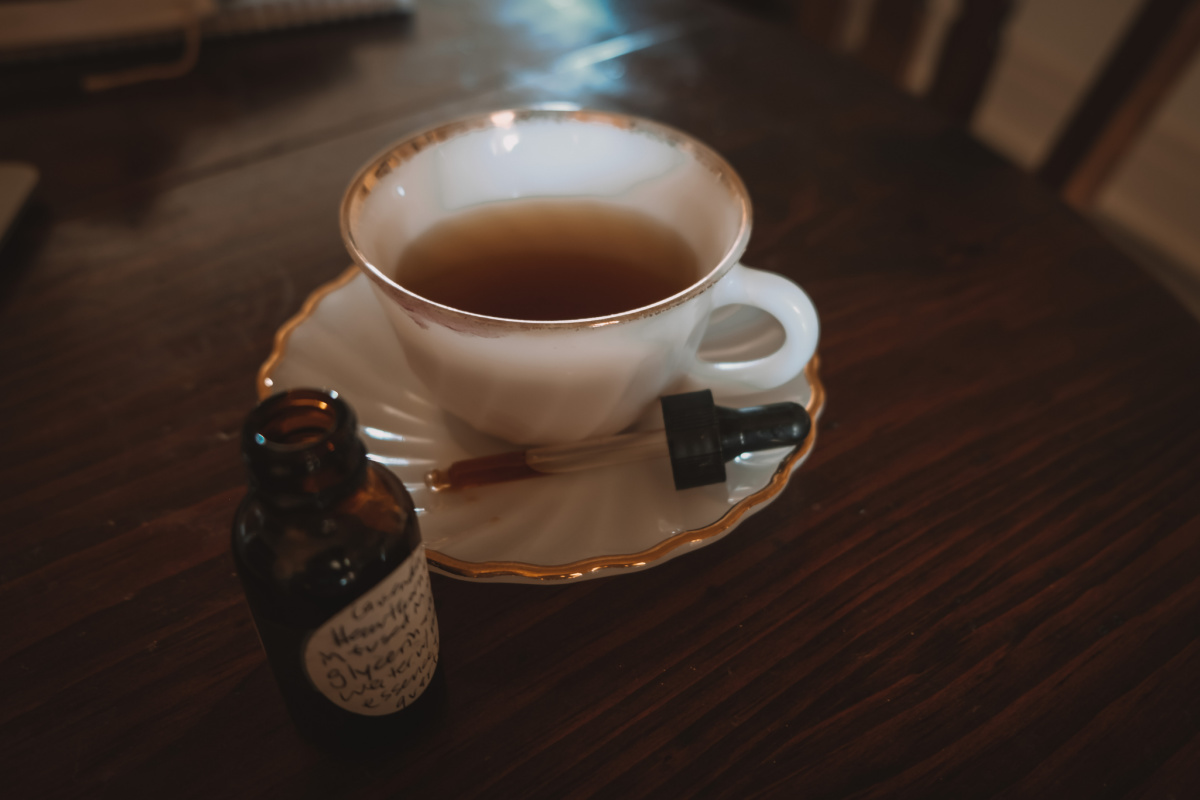
HA: How do you find yourself incorporating herbalism into your daily life?
Caitlin Frazier: Mostly in teas. I’m a huge tea drinker, and actually owned a tea room in Colorado before I moved to Tennessee and became an herbalist. I do it so often, I usually forget I’m actually incorporating herbalism into my life. It’s like breathing. It’s a continuation of what I mentioned about body literacy…if something feels off, I almost absentmindedly reach for the herb or herbs I know will be most helpful, and make an infusion or decoction. I’m convinced there’s a tea for everything!
HA: Did you feel that something in your life was missing before your discovered herbalism? If so, what do you think it was and how was herbalism helped?
Caitlin Frazier: Clearly, I did, even if I didn’t know it. I’ve always been pretty ambitious and adventurous. I was a champion Irish Stepdancer, and have traveled much of the world solo. I also own and operate Frazier Motorcar Company with my father, and have since I was 17. We buy and sell vintage European Collector Cars. But it always felt like I should be doing more. I’m very proud of all of those things, but I think they all could be a little self-serving. Herbalism is a place in which to serve, and I think I deeply longed for that. This is a way I can give back to my community.
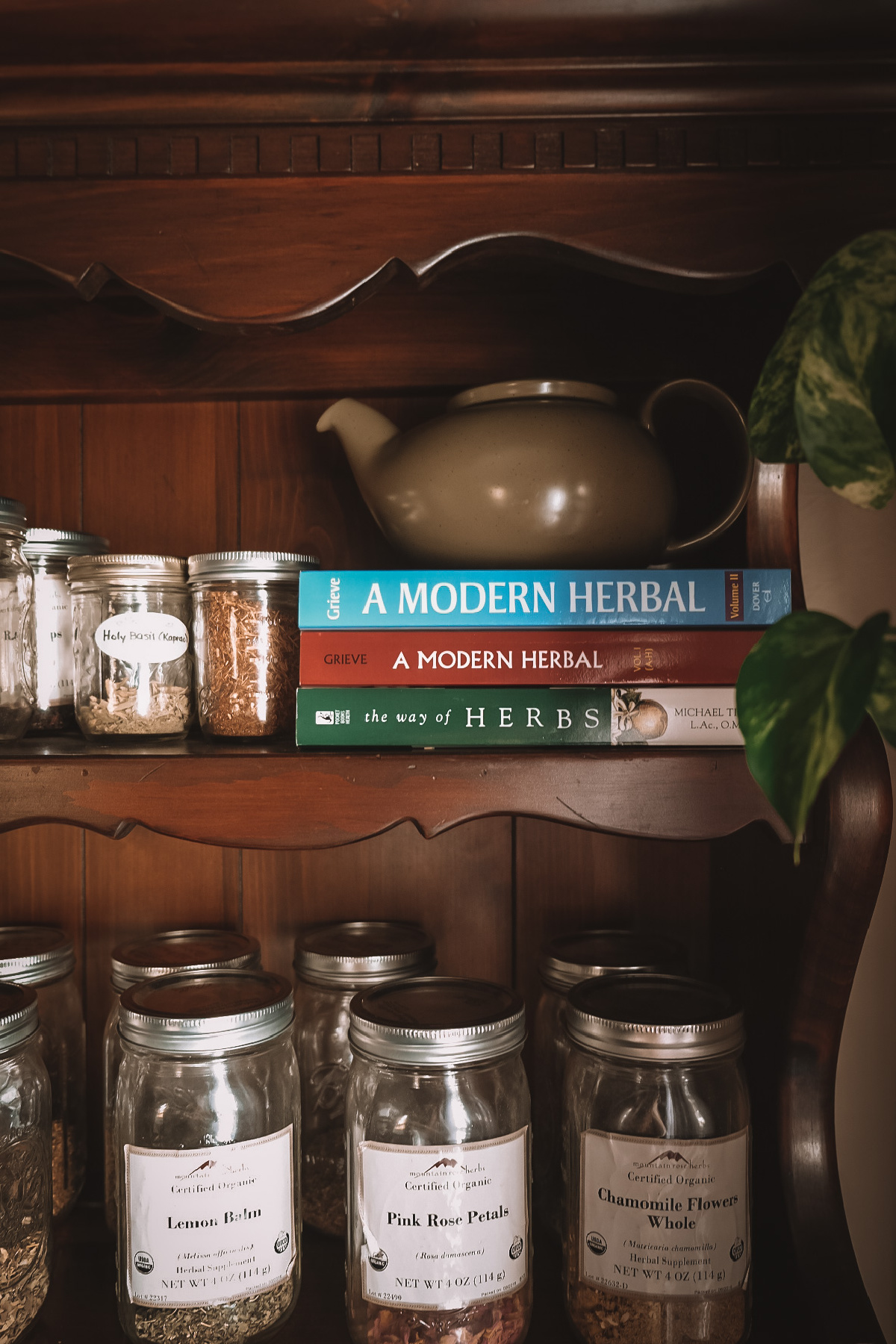
HA: What is the biggest challenge you face in your personal or clinical herbal practice?
Caitlin Frazier: The constant want of a silver bullet is very frustrating. There is no magic pill and everyone wants one. It’s very difficult to get people to change their lifestyles along with taking herbs. Noncompliance is so disheartening. As is the allopathic approach to herbs. Just because hawthorne is supportive for high blood pressure, doesn’t mean it’s good for YOUR high blood pressure, and it’s a hard point to get across. It’s no one’s fault, but rather a result of our conditioning within the realm of Western medicine. This brings me to my next challenge—the complete disregard of Western medicine in favor of natural alternatives! We need both! We should celebrate both, and actively work towards creating unity for more effective healthcare between them.
HA: Which herbalism teachers, authors, or peers do you find most inspiring, and why?
Caitlin Frazier: David Winston is such a strong inspiration for me. He’s a tough cookie, and is extremely knowledgeable…I’d go so far as to say he’s truly a genius in this field. I’ve had the opportunity to see him speak at a few herbal conferences, and I love his no-nonsense approach to herbalism.
Paul Bergner, Stephen Harrod Buhner, and Matthew Wood are all great influences of mine, as well. They’re an absolute wealth of knowledge and wisdom in the art of herbal medicine. Truly living legends.
I also love the French herbalist Maurice Messegue. I’ve read and reread his book so many times the pages are falling apart. I love the very visceral way he practiced herbalism. It’s folk-medicine at its finest, and yet still so very effective. There’s a real romance between his story and his herbalism. I’m not sure how much of his story is true, and I can’t find much in the way to confirm or deny many of his claims of celebrity clients…but I like to believe it’s all true. And at least I can confirm the legitimacy of the herbs he used.
I would be remiss to forget Meagan Visser from Growing Up Herbal! She’s my blog best friend and has been so helpful throughout my herbal journey. She’s much better at product making than I am, so I’m always referencing her site for how to make hydrosols and salves. I had the pleasure of co-writing an ebook with her on Naturally Healthy Hormones, and I honestly don’t know what I’d do without her knowledge and friendship.
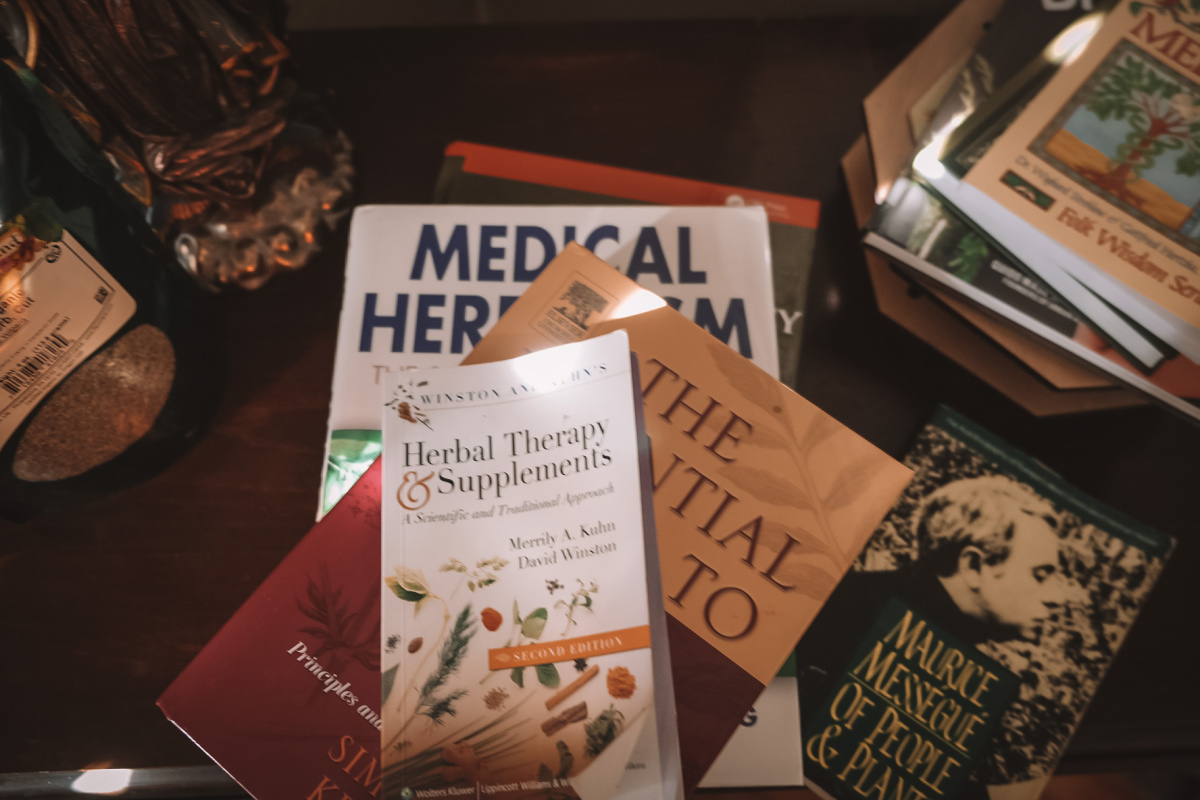
HA: What is your favorite herbalism resource (book, podcast, movie) and why?
Caitlin Frazier: Winston and Kuhn’s Herbal Therapy and Supplements is, by far, my most referenced resource book. As most of my work involves creating protocols or writing in an educational setting rather than creating products, I find that it’s the one I reach for the most for uses and contraindications. It’s falling apart! But it’s an absolutely indispensable part of my personal herbalism.
I also could not imagine having any sort of herbal business without The Herbarium. I probably reference it five times a week! And if I’m writing, it’s just always an open tab!
HA: Do you enjoy sharing your herbal knowledge with others in your life via recipes, products, photography, blog posts, community workshops, etc?
Caitlin Frazier: Very much so! I really enjoy writing and teaching. Generally, you can’t get me to shut up once you get me started. My favorite blog posts are the ones that took me weeks to write, which left me totally exhausted because I put so much time, effort, and research into them. It’s very rewarding!
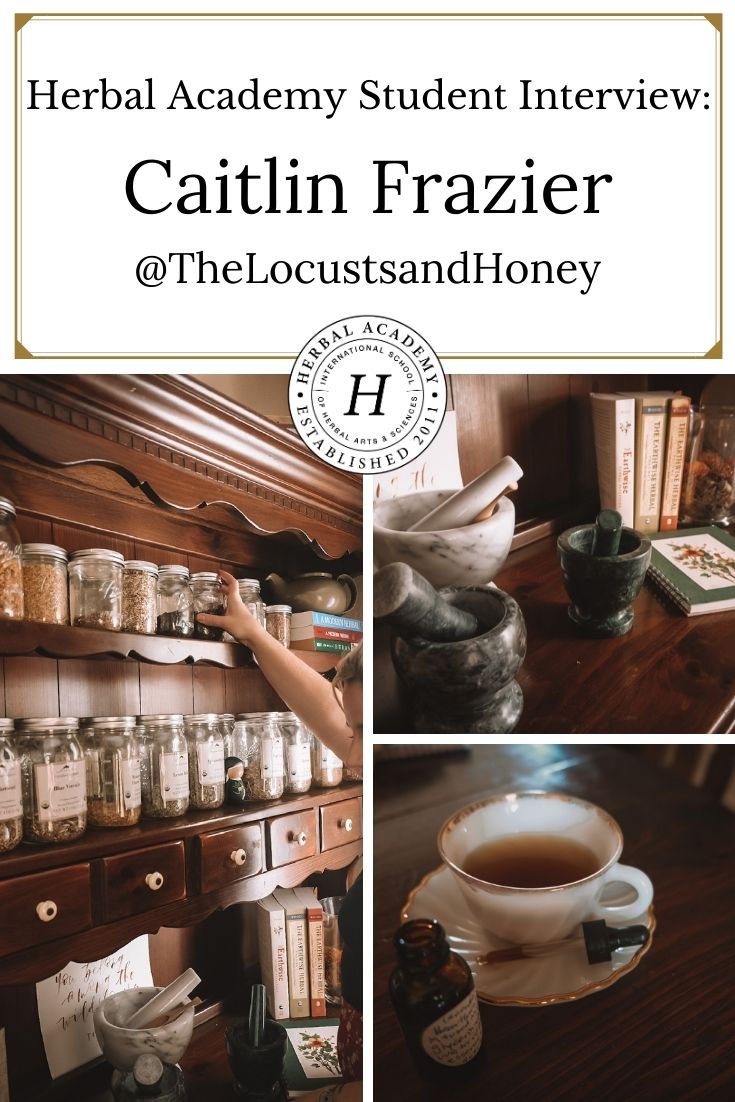
Connect with Caitlin on Instagram @TheLocustsandHoney or via her website Locusts & Honey.
Stay tuned for the next installment of our Student Feature Series with Eduardo @edyunen.
Read past student interviews with:
Chelsea Stephens (@wildflowerandtherose)
Katie Woods (@ritual_skincare)
Alyson Morgan (@AlysonSimplyGrows)
Cat Seixas (@TheOliveTreesAndTheMoon)
Stephanie Pavelko (@MyTinyLagunaKitchen)
Colleen Codekas (@GrowForageCookFerment)
Inspired by Caitlin’s herbal journey? Further your own journey today by perusing our online herbal courses.
Photo credit: All images in this post are by Caitlin Frazier.

